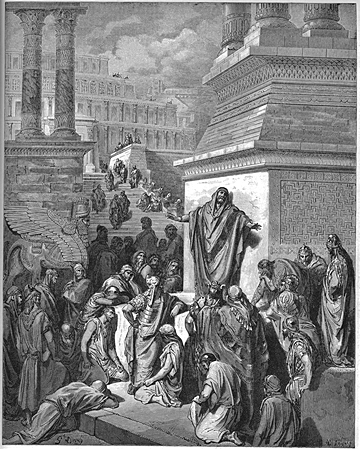Siona 3
1 Pea naʻe toe hoko mai ʻae folofola ʻa Sihova kia Siona, ko hono liunga ua, ʻo pehē,
And the word of the LORD came to Jonah the second time, saying,
2 “Tuʻu hake, pea ke ʻalu ki Ninive, ʻae kolo lahi ko ia, pea ke malangaʻaki ʻi ai ʻae lea te u fekau kiate koe.”
Arise, go to Nineveh, that great city, and preach to it the preaching that I bid thee.
3 Ko ia ne tuʻu hake ai ʻa Siona, pea ne ʻalu ki Ninive, ʻo hangē ko e folofola mai ʻa Sihova. Pea ko Ninive ko e fuʻu kolo lahi ʻaupito ia, ʻo feʻunga mo e fononga ʻi he ʻaho ʻe tolu.
So Jonah arose, and went to Nineveh, according to the word of the LORD. Now Nineveh was an exceeding great city of three days' journey.
4 Pea naʻe kamata hū ʻa Siona ki he kolo ʻi he fononga ʻoe ʻaho ʻe taha, mo ʻene kalanga ʻo pehē, “ʻOku toe ʻae ʻaho ʻe fāngofulu, pea ʻe fakaʻauha ʻa Ninive.”
And Jonah began to enter into the city a day's journey, and he cried, and said, Yet forty days, and Nineveh shall be overthrown.
5 Ko ia naʻe tui ai ʻae kakai ʻo Ninive ki he ʻOtua, pea fanongonongo ʻae ʻaukai, mo nau ai ʻae tauangaʻa, ʻo fai mei he kakai māʻolunga ʻo aʻu kiate ia naʻe siʻi hifo taha ʻiate kinautolu.
So the people of Nineveh believed God, and proclaimed a fast, and put on sackcloth, from the greatest of them even to the least of them.
6 He naʻe ʻomi hono fakahā ki he tuʻi ʻo Ninive, pea ne tuʻu hake ia mei hono nofoʻanga, ʻo ne toʻo hono kofu tōtōlofa mo ne kofuʻaki ʻe ia ʻae tauangaʻa, pea nofo ki lalo ʻi he efuefu.
For word came to the king of Nineveh, and he arose from his throne, and he laid his robe from him, and covered [himself] with sackcloth, and sat in ashes.
7 Pea naʻa ne fekau ke fanongonongo mo fakahā ʻi Ninive, kuo fono ʻae tuʻi mo ʻene houʻeiki, ʻo pehē, “ʻOua naʻa kamata ha meʻa ʻe ha taha pe ʻe ha manu, ʻe he tauhi, pe ʻe ha fanga manu: ʻoua naʻa nau kai pe te nau inu ha vai
And he caused [it] to be proclaimed and published through Nineveh by the decree of the king and his nobles, saying, Let neither man nor beast, herd nor flock, taste any thing: let them not feed, nor drink water:
8 Kae tuku ke kofuʻaki ʻae tauangaʻa ʻe he tangata, pea mo e manu, pea tangi fakamanavahē ki he ʻOtua: ʻio, ke tafoki taki taha kotoa pē mei hono hala kovi, pea mei he fakamālohi ʻoku ʻi honau nima.
But let man and beast be covered with sackcloth, and cry mightily to God: yes, let them turn every one from his evil way, and from the violence that [is] in their hands.
9 Ko hai ʻoku ʻilo, naʻa ʻe liliu, pea fakatomala ʻae ʻOtua mo ne fakatafoki atu ʻae kakaha ʻo hono houhau, koeʻuhi ke ʻoua naʻa tau ʻauha?”
Who can tell [if] God will turn and repent, and turn away from his fierce anger, that we perish not?
10 Pea naʻe ʻafio ʻe he ʻOtua ki heʻenau ngāue, kuo nau tafoki mei honau hala kovi: pea naʻe liliu ʻae ʻOtua mei he kovi ʻaia naʻa ne pehē te ne fakahoko kiate kinautolu; pea naʻe ʻikai te ne fai ia.
And God saw their works, that they turned from their evil way; and God repented of the evil, that he had said that he would do to them; and he did [it] not.





















